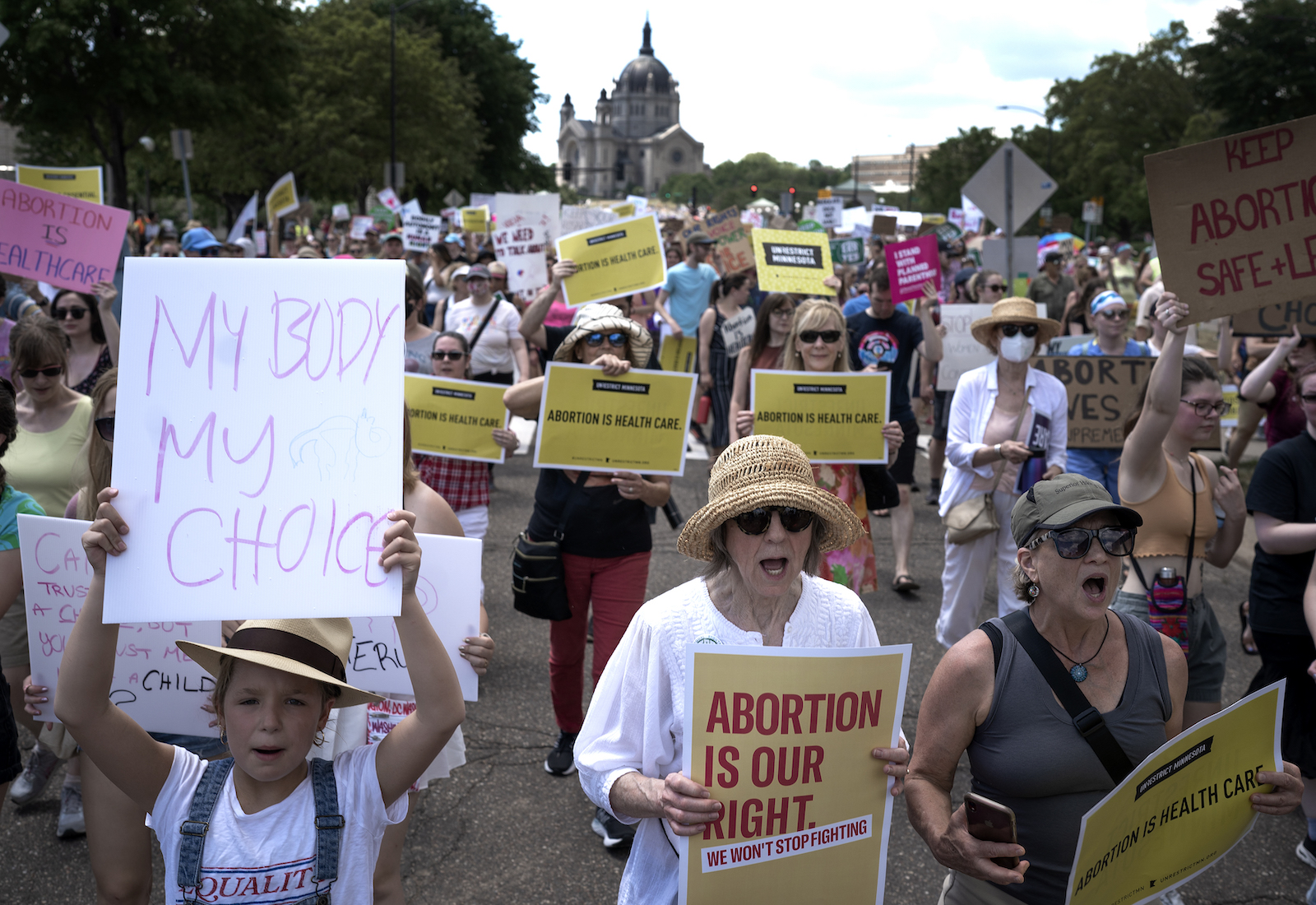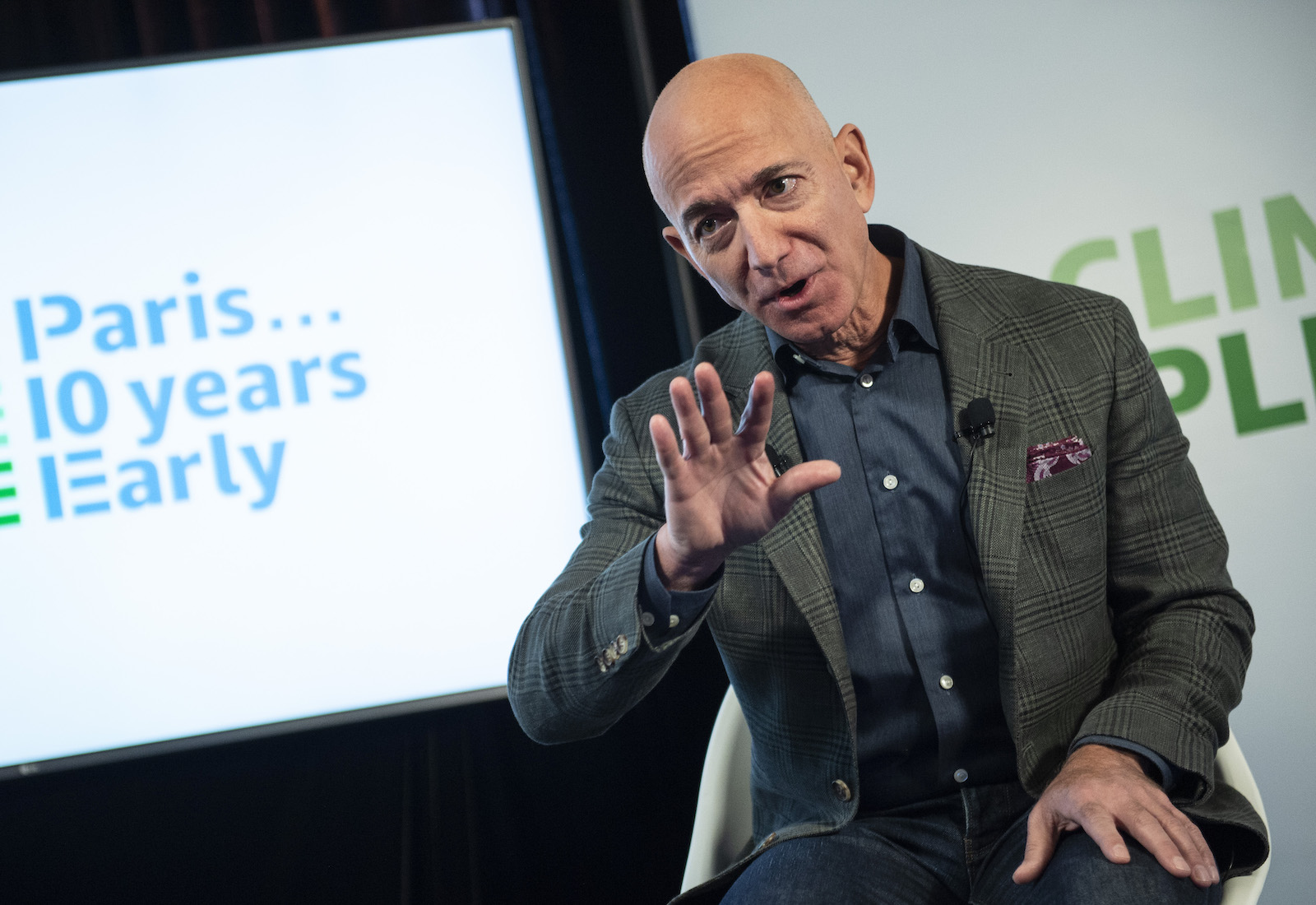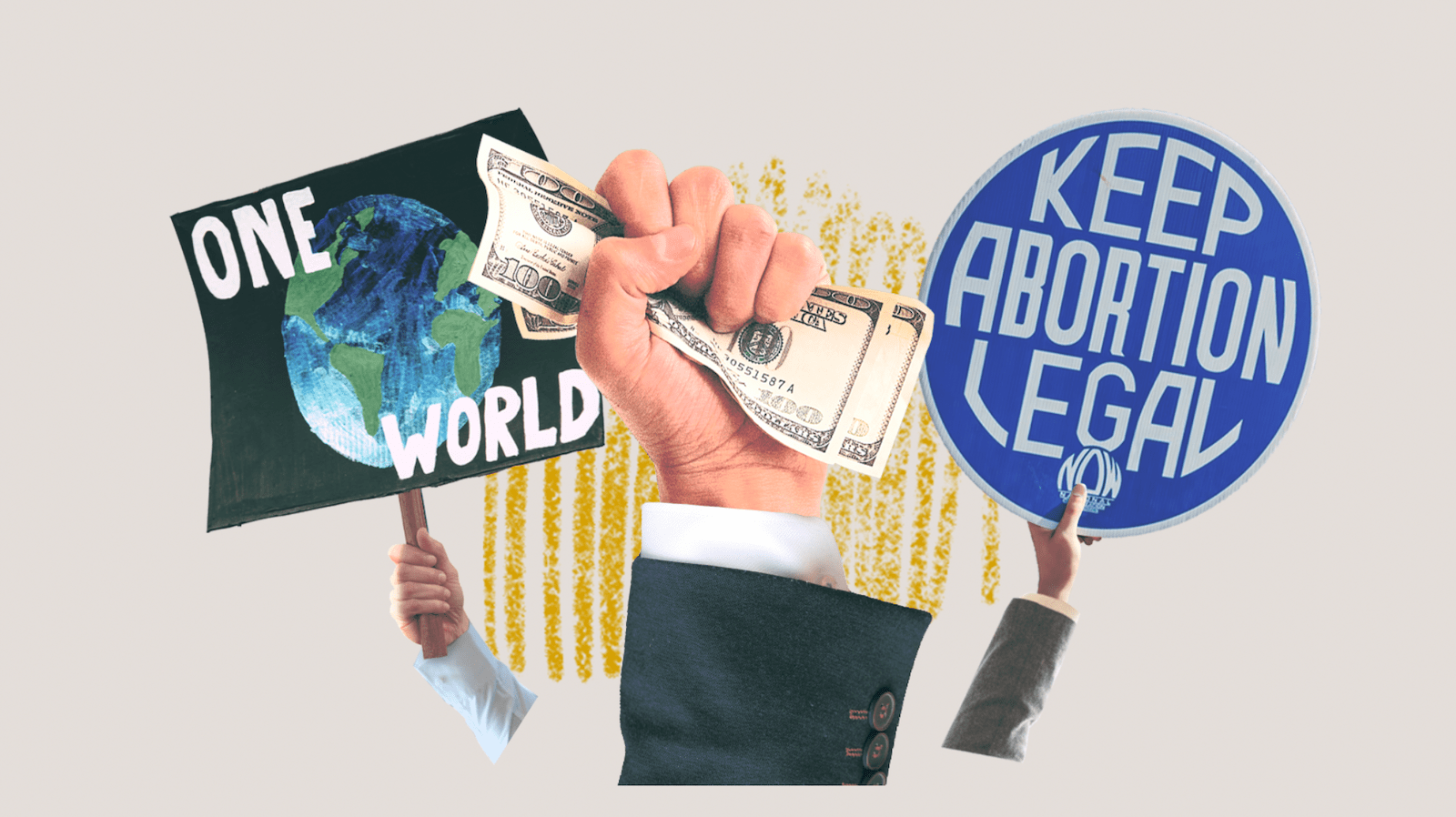Even before the Supreme Court officially struck down Roe v. Wade in late June, corporations were already announcing how they would come to the rescue. PayPal, JPMorgan Chase, Microsoft and several other companies said they would expand their healthcare benefits for employees to cover travel to abortion clinics. Later, Lyft and Uber said they would back drivers with legal support if they were sued for transporting passengers to get an abortion. “Employers like us may be the last line of defense,” one tech executive told the New York Times.
Companies have spent years saying something similar about another big issue: climate change. In the absence of strong federal policies, the private sector has insisted that it’s stepping up with pledges to slash emissions and prevent catastrophic global warming.
“As a strong global franchise, we have an important role to play in the transition to a world where net-zero carbon emissions are a reality,” an insurance executive said in a survey for a recent report on corporate sustainability.
With both issues — abortion access and climate change — companies have framed themselves as nimble, socially responsible protectors of the public good. But there are hard limits on what corporate action can accomplish. Although the private sector can draw public attention to important issues, experts say corporate pledges are no substitute for strong federal action. Whether it’s protecting the climate or the right to choose, they argue that businesses’ profit-seeking nature makes them ill-suited to deliver broad and important social goals.
“Companies don’t do anything out of the goodness of their hearts,” said David Levy, director of the Center for Sustainable Enterprise and Regional Competitiveness at the University of Massachusetts Boston. “They’re going to look after their profits,” he added, even if that means privately lobbying against the values they espouse.
For example, many tech and automobile companies vow climate action even as they support conservative trade groups like the U.S. Chamber of Commerce, which has lobbied aggressively to tank federal climate action. Similarly, major corporations that have inveighed against the overturning of Roe v. Wade have donated hundreds of thousands of dollars to the Republican Attorneys General Association, a group that has made it a foremost priority to erode reproductive rights even after the reversal of Roe.

Beyond rank hypocrisy, there’s another big problem with trusting corporations to address society’s biggest problems: They can only deliver piecemeal social and environmental protections. They create “islands of progressive activity,” as Chris Wright, a professor of organizational studies at the University of Sydney Business School, put it. Corporate promises to ensure abortion access for their employees, for example, cover only a tiny fraction of the population and may leave out those who need the most help.
“The people for whom money is a barrier” often don’t work for the Fortune 500 companies that have offered employees up to $7,500 in abortion-related travel assistance, said Linda Hirshman, a lawyer and author who writes about social change. Most companies — including Walmart, the U.S.’s largest employer — made no plans to expand health care benefits as it became clear that Roe would be overturned. (Walmart told employees last month that it was weighing its options.) As of June 30, a survey from the asset management firm Mercer found that only 5 percent of companies had adopted a formal policy to cover a portion of their employees’ travel costs, although 23 percent said they were planning to implement one.
There’s a parallel to climate action here. In the absence of strong federal climate policy, states and corporations have been left to fill the gaps. Just as with reproductive rights, states along the West Coast and in the Northeast are passing policies to prevent catastrophic global warming while much of the rest of the country remains in the thrall of inaction. In red states, while corporate action often makes up a significant portion of the climate action underway, it is still extremely limited.
The problem is that not every company has a climate pledge. As of June 1, only about one-third of companies listed on the global Forbes 2,000 list had net-zero targets, leaving a large gap in the bloc’s collective climate commitment. And even then, research published this spring suggests that some of the planet’s dirtiest assets — things like oil fields — are being offloaded by oil majors to smaller companies without climate pledges. This allows large firms to clean up their carbon ledger books even as emissions continue unabated.

What’s more, under closer scrutiny, many climate pledges tend to fall apart — perhaps because they lean on unreliable carbon offsets, or because they set far-off goals with no interim targets or accountability mechanisms. A recent report from Net Zero Tracker, an analysis project coordinated by nonprofit organizations and research labs, highlighted an “alarming lack of credibility” throughout the net-zero landscape. It found that the majority of companies promising to achieve net-zero had no plans to address “scope 3” emissions — the emissions associated with the products they sell to consumers. For oil and gas companies, this category makes up more than 75 percent of their climate pollution.
Lena Moffitt, chief of staff for the nonprofit advocacy group Evergreen Action, doubts the sincerity of many corporate climate commitments. “Fossil fuel companies are making net-zero pledges left and right while they are also doing the opposite,” she said, highlighting oil majors’ plans to keep expanding oil and gas exploration. “They are saying one thing and doing another.”
Auden Schendler, senior vice president of sustainability for the Aspen Ski Company and a prominent critic of corporate responsibility commitments, suspects that most companies make pledges just to burnish their reputations — not to realistically address urgent problems. On reproductive rights, for example, there are lots of unresolved questions about how companies’ travel assistance programs will actually work. Will contractors be eligible? Will employees have to disclose their pregnancies to HR? What will happen if states subpoena companies, looking for information about employees who have traveled out of state for an abortion?
“While I think it’s great that [companies] are trying to help, there are some real worries with requiring people to disclose their abortions and their medical procedures in general to their employers,” said Brittany Leach, a feminist political theorist and an incoming assistant professor at Southern Illinois University, Carbondale.
According to Levy, the University of Massachusetts professor, company leaders are constrained by the realities of a capitalist economic system. They can nod to social and environmental values that their customers hold, but it’s harder to flesh out far-reaching policies on those issues because the firms they control are designed to be profit-driven. They can’t deviate much from that, Levy said. “You can’t ask a shark to stop eating small fish; it’s in its DNA.”
According to Schendler, solving climate change and protecting all Americans’ reproductive rights requires a nationwide approach that only the federal government can provide. “The only way you solve giant problems is through policy regulations,” he said.

On climate, Moffitt said Congress should continue to pass far-reaching legislation that transforms every sector of the economy “at the magnitude and scale” that the crisis demands. This could include setting stringent emissions standards for buildings, heavy industry, and power generation, as well as stronger supply-side policies to limit new fossil fuel extraction. (The $433 billion climate act that President Joe Biden recently signed would incentivize the adoption of clean energy technologies while also expanding drilling on public lands.) In the meantime, proposed rules from the Securities and Exchange Commission, a federal agency that oversees publicly traded companies, could also crack down on corporate pledges, weeding out those that are disingenuous and helping to unify the rest around a scientifically backed path to limit global warming to 1.5 or 2 degrees Celsius (2.7 or 3.6 degrees Fahrenheit).
Levy, who has interviewed corporate leaders for his research, said that many companies might actually appreciate stronger government regulation, as it provides regulatory certainty that firms can incorporate into their long-term planning.
The fight for reproductive rights presents a different set of options for the federal government, starting with the passage of the Women’s Health Protection Act, which would enshrine the right to an abortion into federal law. Even more broadly, it could recognize the ratification of the Equal Rights Amendment — which guarantees women a suite of human rights and would support the right to an abortion — and ratify the United Nations Convention on the Elimination of All Forms of Discrimination Against Women. Repealing the Hyde Amendment, which bars federal funds from being used for abortion-related services, would also help.
Schendler urged companies to throw their full support behind these federal efforts, rather than privately lobbying against them or solely adopting internal policies on health care and climate pollution. CEOs “need to go to Washington, need to be writing op-eds,” he said. Businesses should be “using corporate-power lobbying and leadership to drive systems change.”
Schendler echoed the other experts Grist spoke with, who mentioned a fundamental mismatch between corporate actions and the systemic problems they’re meant to address.
“The argument that we’ve still got corporations and possibly local governments? That’s woefully insufficient for what’s required,” said Wright, speaking specifically about climate change. To reduce the harm that’s coming from rising temperatures, he added, “you need a whole systems approach, and that requires government regulation.”



